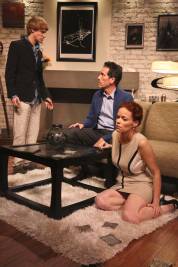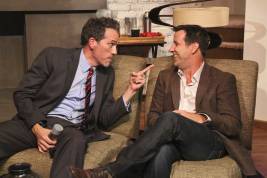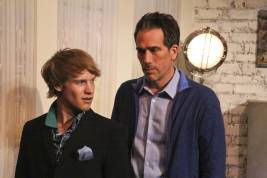
A different kind of Love That Dare Not Speak Its Name speaks its name in Edward Albee’s Tony Award-winning Best Play Of 2002, The Goat, Or Who Is Sylvia?, the latest from the theater and director who revived Ira Levin’s Deathtrap to brilliant, controversial life a couple years back—and that’s about all I have to say about the team’s latest production before launching into a spoiler-filled second paragraph. Proceed with caution.
The Goat Or, Who Is Sylvia? is about a man in love with a goat. Not just in love with, but engaged in a full-fledged romantic, sexual affair with said Sylvia—news which doesn’t sit well with his wife of twenty years, who finds her perfect life shattered in an instant.
 Albee’s tragicomedy centers on Martin Gray (Paul Witten), an enormously successful and highly esteemed architect just turned fifty, a man every bit as much in love with Stevie (Ann Noble) as he was on their wedding day twenty years ago—and for Stevie the feeling is mutual. It may have taken the couple a moment or two to accept the news that their seventeen-year-old son Billy (Spencer Morrissey) likes boys and not girls, but in all other ways, Mr. and Mrs. Gray would seem to be living a charmed life.
Albee’s tragicomedy centers on Martin Gray (Paul Witten), an enormously successful and highly esteemed architect just turned fifty, a man every bit as much in love with Stevie (Ann Noble) as he was on their wedding day twenty years ago—and for Stevie the feeling is mutual. It may have taken the couple a moment or two to accept the news that their seventeen-year-old son Billy (Spencer Morrissey) likes boys and not girls, but in all other ways, Mr. and Mrs. Gray would seem to be living a charmed life.
Martin’s selection to design and build the “World City Of The Future” brings his journalist best friend Ross (Matt Kirkwood) over for a video interview, but an easily distracted Martin seems to have other things on his mind. Pressed for an explanation, he confesses the truth. He has fallen in love with Sylvia, and the photo he shows Ross leaves little doubt as to just who (or what) Sylvia is.
 This of course places Ross in a bit of a conundrum. Ought he keep this kind of knowledge a secret, or would it be in everyone’s best interest that the truth come out? Ross selects the latter option, sending Stevie an old-fashioned hand-written letter which reveals Martin’s special form of adultery in no uncertain terms.
This of course places Ross in a bit of a conundrum. Ought he keep this kind of knowledge a secret, or would it be in everyone’s best interest that the truth come out? Ross selects the latter option, sending Stevie an old-fashioned hand-written letter which reveals Martin’s special form of adultery in no uncertain terms.
As might be expected, the shit (or should that be dung?) hits the fan.
Anyone with at least a rudimentary knowledge of the work of three-time Pulitzer Prize winner Albee will surmise, quite rightly, that The Goat Or, Who Is Sylvia? isn’t a play “about bestiality,” or is at the very least much more than that. Indeed, Albee has far greater things on his mind than simply shocking us or testing the limits of our liberal tolerance.
Here’s what the playwright himself has to say about The Goat Or, Who Is Sylvia?:
“Every civilization sets quite arbitrary limits to its tolerances. The play is about a family that is deeply rocked by an unimaginable event and how they solve that problem. It is my hope that people will think afresh about whether or not all the values they hold are valid.”
 Far more than a desire to shock, The Goat Or, Who Is Sylvia?, makes its audience ponder as to whether there are indeed limits on whom (or what) we human beings have the right to love.
Far more than a desire to shock, The Goat Or, Who Is Sylvia?, makes its audience ponder as to whether there are indeed limits on whom (or what) we human beings have the right to love.
Those afraid of being hit on the head with a sledge-hammer can rest assured. Under Ken Sawyer’s astute direction, Albee’s questions are asked amidst peals of laughter, and though some of these laughs may be from embarrassment, most come as products of Albee’s sharp, witty writing and his skill with a punch line. (My personal favorite is when Stevie responds to Ross’s comment that “I’m sure you’d rather hear it all from a dear friend,” with an “As opposed to what? The ASPCA?!”)
Witten makes an indelible impression as a man so sincere in his belief in the purity of his love that our heart breaks for him and we may even find ourselves inching ever so slightly to his side despite Stevie, Billy, and Ross at their most lacerating.
An excellent Kirkwood lulls us into thinking of guy-next-door Ross as the best friend anyone could ever hope for (which must have been how Jesus felt about Judas), making his transformation to betrayer all the more startling.
 Morrissey, barely out of his teens himself, makes a noteworthy Los Angeles theater debut as a young man whose coming out process pales against the discovery of a father’s “alternative lifestyle,” a painfully real adolescent whom Morrissey brings to engaging life with equal parts teenage bravado and teenage insecurity.
Morrissey, barely out of his teens himself, makes a noteworthy Los Angeles theater debut as a young man whose coming out process pales against the discovery of a father’s “alternative lifestyle,” a painfully real adolescent whom Morrissey brings to engaging life with equal parts teenage bravado and teenage insecurity.
Finally, in the role that scored Mercedes Reuhl a pair of Tony and Drama Desk Award nominations, LA. stage treasure Noble gives us a fiery torrent of a betrayed wife, her words wounding one minute, her rage blazing the next. What would elevate Noble’s performance to the extraordinary would be a deeper excavation into pain so excruciating that it can provoke an actor’s tears … and an audience’s in response.
 Scenic designer Robert Selander has created a stunningly detailed set on the intimate Davidson/Valentini Theatre stage, an elegant, ultra-modern downtown high-rise living room that, if scaled a bit larger, could easily grace a major regional theater. Selander’s design is minutely dressed by property master Bethany Tucker and exquisitely lit by Matt Richter. Paula Higgins’ costumes are character-perfect, Ken Saywer’s sound design makes astute, subtle use of Rihanna’s “We Found Love,” and stage violence is in the adept hands of fight director Edgar Landa.
Scenic designer Robert Selander has created a stunningly detailed set on the intimate Davidson/Valentini Theatre stage, an elegant, ultra-modern downtown high-rise living room that, if scaled a bit larger, could easily grace a major regional theater. Selander’s design is minutely dressed by property master Bethany Tucker and exquisitely lit by Matt Richter. Paula Higgins’ costumes are character-perfect, Ken Saywer’s sound design makes astute, subtle use of Rihanna’s “We Found Love,” and stage violence is in the adept hands of fight director Edgar Landa.
The Goat, Or Who Is Sylvia? is produced by Jon Imparato and presented by the Los Angeles LGBT Center’s Lily Tomlin/Jane Wagner Cultural Arts Center. Shaunessy Quinn is assistant director and Kathleen Jaffe is stage manager.
Sea Change. The Sonneteer. Deathtrap. The Goat, Or Who Is Sylvia? Productions at the Davidson/Valentini Theatre at the Los Angeles LGBT Center’s Village at Ed Gould Plaza don’t come around all that often, but when they do, quality is guaranteed. The latest from this mouthful of a producing entity is no exception.
Davidson/Valentini Theatre, 1125 N. McCadden Place, Los Angeles.
www.lalgbtcenter.org/theatre
–Steven Stanley
September 28, 2014
Photos: Michael Lamont
Tags: Davidson/Valentini Theatre, Edward Albee, Los Angeles Theater Review



 Since 2007, Steven Stanley's StageSceneLA.com has spotlighted the best in Southern California theater via reviews, interviews, and its annual StageSceneLA Scenies.
Since 2007, Steven Stanley's StageSceneLA.com has spotlighted the best in Southern California theater via reviews, interviews, and its annual StageSceneLA Scenies.







 COPYRIGHT 2024 STEVEN STANLEY :: DESIGN BY
COPYRIGHT 2024 STEVEN STANLEY :: DESIGN BY